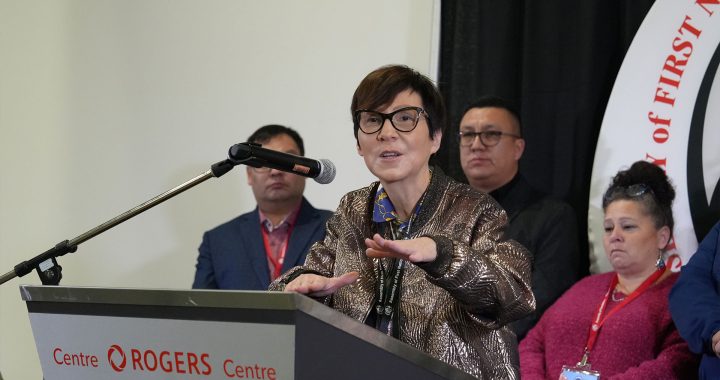An APTN News investigation has found that on average, about 30 percent of birth alerts in the northwestern Quebec region of Abitibi-Témiscamingue are for Indigenous newborns.
Indigenous people make up about four per cent of the region.
The Anishnabeg communities in the Abitibi-Témiscamingue region say these birth alerts, the practice of youth protection workers taking children away from their parents after they’re born, are caused by racial profiling and having a negative effect on their communities.
“There are some who are very afraid, even today when we talk to each other, of going to the hospital and giving birth in the hospital” says Lucien Wabanonik, Anishnabe Nation of Lac-Simon councilor and facilitator of Mino Obigiwasin, an organization that serves four Anishnabeg communities in the area of youth protection.
“I think there are a lot of birth alerts. A lot. Which is extremely unfortunate and deplorable. I would even say unacceptable because it is not sure that these women who give birth have difficult social situations. Yes, I believe that there is racial profiling in these various hospitals in Abitibi-Témiscamingue.”
Documents obtained by APTN under the Access to Information Act, shows Wabanonik is correct about there being a large number of birth alerts.
In 2020 there were a total of 54 birth alerts, 17 of which were for Indigenous babies.
2019 had similar numbers, with 18 of 54 birth alerts being for Indigenous newborns less than three days old.
Another access to information request shows that eighty youth protection alerts, or 40 per cent, were from the Val d’Or hospital, located about 530 km northwest of Montreal.
It is unknown how many of these alerts were for birth alerts or Indigenous families. Of those reports nearly half were for “serious risk of negligence”
The Val d’Or hospital also has a reputation.
It was the subject of several testimonies from the Quebec inquiry into relations with Indigenous Peoples concerning discrimination.
Wabanonik says there are better ways to help new mothers whose children may be at risk.
“Depending on the regions and the needs of the communities, elements must be quickly put in place to meet the needs of women giving birth in hospitals. We can’t just keep waiting, it’s important,” said Wabanonik.
In 2019 the National Missing and Murdered Indigenous Women and Girls Inquiry made the termination of birth alerts one of their calls for justice.
They also called the practice “racist and discriminatory”.
Six provinces in Canada have banned the practice which was called “unconstitutional” and “illegal” by the attorney general of British Columbia.
APTN requested an interview with the Quebec Minister of Health and Social Services Lionel Carmant.
The minister was not available but provided a statement in French.
“The decision to use an unborn baby alert is a clinical decision based on risk factors and not on the cultural identity of families,” he said.
“… the practice does not necessarily lead to a removal of the child at birth, but rather to a report that will be processed and assessed against the youth protection law, which, where appropriate, leads to the appropriate support for families.”
Wabanonik says birth alerts have a hidden cost to his community of Lac-Simon, located about five and a half hours northwest of Montreal.
“I know very well from experience and having seen certain things in the community here in Lac-Simon…There are young women who took their own lives.”
Meanwhile the health ministry acknowledges that there are issues with racial profiling.
They say they are waiting for the final report of the recently completed Commission on the Rights of Children, to be released on April 30, and say they intend to act upon recommendations made towards Indigenous communities.
Editor’s Note: Information in the story regarding the number of birth alerts issued in the Abitibi-Témiscamingue region in Quebec has been corrected. Quebec’s access to information officer handling the file sent incorrect data to APTN – and that information was used in the story. That error has been corrected.










